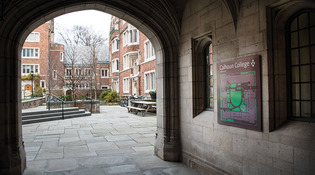 loading
loading
Light & VerityCalhoun decision will be revisitedA committee has developed principles to guide decisions on renaming.  Mark Zurolo ’01MFAThe Yale Corporation decided last spring that Calhoun College would retain its name, but that decision will be reconsidered using a set of principles devised by a university committee. View full imageLess than a year after the Yale Corporation decided to retain the name of Calhoun College, President Peter Salovey ’86PhD has appointed a group of advisers to reconsider whether the name ought to be changed. The issue will be revisited in light of a set of principles on renaming, created by a committee that released its report in December. Calhoun is named for the nineteenth-century politician and Yale graduate John C. Calhoun, Class of 1804, who was a prominent US senator, vice president, and political theorist. He was also an outspoken advocate of slavery, calling it a “positive good.” Calls from student groups and others to change the name sparked a campuswide conversation last year that led to the decision in April to keep the name. After further vocal protests from faculty and students, however, Salovey appointed a committee in August to establish a set of principles to guide future decisions about renaming, leaving open the possibility that the Calhoun decision could be revisited. The 12-person committee, chaired by law professor John Witt, included faculty, staff, alumni, and students. They held open discussions, looked at renaming controversies at other universities in recent years, and studied the Calhoun controversy, including all the feedback that had been received over the previous year. Alumni, the report notes, “were more skeptical than other parts of the university community about the prospect of renaming,” and many alumni considered the idea “a dangerous form of ‘political correctness.’ . . . Some such alumni viewed our committee with derision and scorn.” What emerged from their work was a set of principles to be applied when the subject of renaming comes up. First and most basically, the committee expressed “a strong presumption against renaming a building on the basis of the values associated with its namesake.” That presumption is rooted in what Witt calls a “moral modesty” that the committee brought to the project. “We were all really attentive to the fact that we aren’t perfect people,” says Witt, “and we don’t have a perfect moral vision of the past.” The report argues that the presumption against renaming is “at its strongest when a building has been named for someone who made major contributions to the university,” either through their work or “contributing resources.” Those ideas established, the committee devised four questions to be asked:
The committee suggests that “renaming will typically prove warranted only when more than one principle listed here points toward renaming.” (The report and supporting materials are on the committee’s website.) On December 2, the same day the report was released, Salovey announced that he had appointed former Yale trustee Len Baker ’64 (a Calhoun alumnus), history professor John Lewis Gaddis, and African American studies chair Jacqueline Goldsby to review the question of renaming Calhoun, employing the committee’s principles. “We moved forward primarily because the interest in the question has only become stronger—across multiple constituencies,” Salovey told the Yale Alumni Magazine in an interview. “With other universities grappling with similar naming controversies, we realized the name of Calhoun College was not an isolated issue. I suspect the principles developed by Witt and his committee will serve Yale well for quite some time.” Salovey expects the group to make a recommendation to the Yale Corporation, the university’s board of trustees, in time for the Corporation to make a decision in early 2017.
|
|
2 comments
-

JOSEPH T MCCABE, 12:00pm January 17 2017 |  Flag as inappropriate
Flag as inappropriate
-

David Jeffery, 5:28pm January 17 2017 |  Flag as inappropriate
Flag as inappropriate
The comment period has expired.IT WILL BE A TIE SO THEY CAN FORM ANOTHER COMMITTEE ( PAID) TO BS AND WASTE TIME.
A TIE WILL PLACATE ALL THE UNDERGRADS,IN PARTICULAR,WHICH IS ALL THAT PRESIDENT SALOVEY WANTS ( WHICH IS SMART)
Hey renaming junta, don't neglect that slave-trading and snuff-box-collecting Elihu Yale.